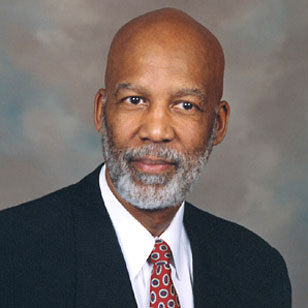By Neil Earle

“We are born into a world where the drama is already going on. You’re handed a script and supposed to make sense of your part. Don’t be afraid to question what you’ve been handed.”
The speaker was Dr. Terrence Roberts, psychologist, educator and consultant and better known as one of nine black students who challenged segregation in the city of Little Rock, Arkansas in September, 1957.
In his address to some 1000 students and faculty at Citrus College in Glendora, California on February 8, 2007, Dr. Roberts was a riveting yet low-key and entertaining speaker, holding attention with both sincerity and an intellectual feistiness that was appealing. “It was like watching living history,” said Political Science professor Lee Ross.
Dr. Roberts said he began his life growing up thinking white people were all crazy – the rules, the laws, the enforced segregation of the black and white races. “I thought Little Rock must be an aberration. No it wasn’t. It was a microcosm and white people I met weren’t crazy, they were part of this system too. And some of them knew quite well what they were doing.”
Dr. Roberts eloquently and swiftly painted the picture of the black and white experience since Jamestown in 1619. “Then in 1954 came Brown versus the Board of Education but subsequent decisions were not made in the spirit of that decision,” he commented. “As a result we are dealing with a residual carry-over, we are still in transition from 1954, dealing with systemic elements that carry on the madness.”
He was 13 years old when Brown was passed. Then he and 149 other black students accepted the challenge to integrate Little Rock Public High School in September, 1957. They were soon reduced to nine. “I respected people’s decisions. It would be dangerous. I did not think the country was going to let us down.”
Martin Luther King, Jr. came to talk to the Nine. He said: “You can’t accept the mantle of non-violence unless you truly love your enemy. Loving people no matter what they do to you takes you to the moral high ground.”
His mother was a key influence on his life. “Terence, you are an animal but you are a human animal,” she would tell her son. ”You can dialogue. You can discuss. You can reason.”
Dr. Roberts also reiterated historical facts that long forgotten. Though the Little Rock Nine felt they had won by completing their school year without harm, the Governor shut down every high school in Little Rock the next year, 1958-59. That was a disappointment. “These students never got educated and they get in trouble and are a drain on the public treasury to this day. We are still paying for decisions made in the 1950’s.”
He also revealed that one of the Nine did get expelled for finally succumbing to the pressure and fighting back, but she did finish her education in another state.
Preston Roberts himself moved to Los Angeles to finish high school and to take higher degrees. “Youth passes swiftly,” he told the young people.” Commit to learning today while you have the energy and the flexibility. Invest yourself fully in your education.” The Citrus students peppered him with questions till the very end, evidence that Dr. Robert’s message had hit home. He addressed black-Hispanic gang violence. “People today fight across racial and cultural lines,” he said. “Don’t fall for that. A lot of this is orchestrated by people who have a vested interest in playing a game of, ‘You go fight while we reap the cream.’ That’s dumb.”
He was blunt. “This country has dedicated itself to maintaining walls of separation. Don’t sit down and cry about it, figure out a way around that wall.” One of Dr. Robert’s favorite words is “navigate,” you have to learn to navigate the system. “It ‘is,’ get over it and go forward!” He praised white allies in 1957 such as school-mate Robin Woods who intentionally crossed the lines to share textbooks and offer support. “Our experience in Little Rock is evidence that you cannot let other people define you.”
What does he think of Affirmative Action? “We’ve always had it in this country since 1776. Only the Founding Fathers intended it to be for white males and not anyone else.”
Overall, he urged, if you’re up against this system or any series of problems do two things:
First, develop a high level awareness of what is going on.
Second, make a commitment to prepare yourself.
“Adversity just ‘is.’ You must learn to navigate the terrain. One of the best ways is to read.” He found himself many times falling asleep in library stacks: “There’s all this information sitting on library shelves gathering dust….”
Someone asked, “Does non-violence work?” Dr. Roberts shot back. “It’s an option. By the way: Does violence work?”
What about students who cursed and mistreated him? Did any change?
“Hazel Brown’s big open mouth is in all the pictures of Little Rock. She was a poster child for white racism but she repented. She came to me and apologized and asked for forgiveness.”
Finally, he feels his mom’s advice is even truer today in the age of gangs. “Peer pressure is mythical,” she used to day. “Everyone comes into this universe with potential. The info is there. You don’t even have to buy it. It’s free.”
“Potential.” It’s another Terrence Roberts word. Listening to him speak and interact you have to think: He has certainly developed his.